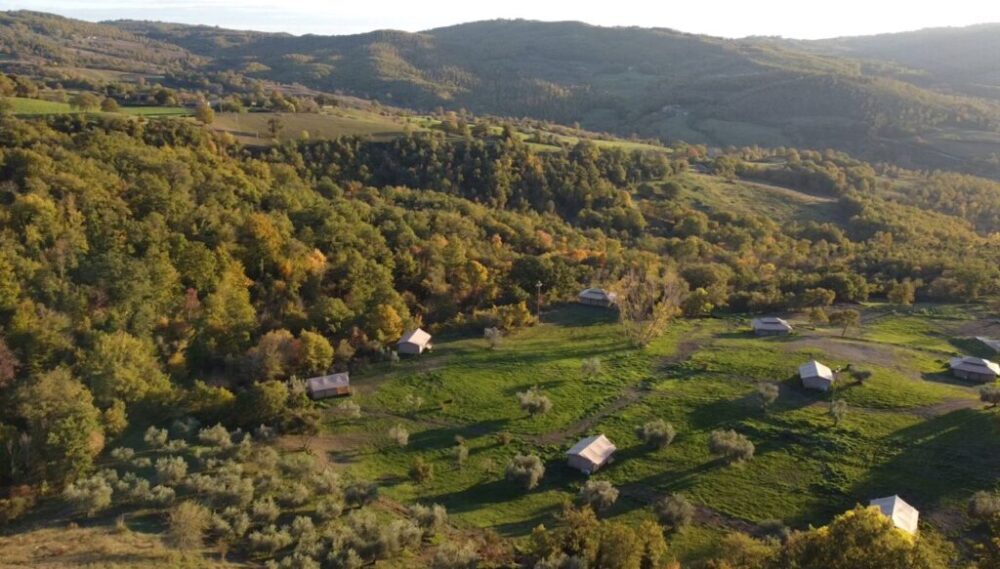THE WILDERNESS ACADEMY AT TENUTA SAN LODOVICO IN THE PROVINCE OF SIENA PROMOTES THE CONSERVATION OF BIODIVERSITY AND THE WELL-BEING OF THE COMMUNITY THROUGH LAND PROTECTION INITIATIVES AND STUDY OF THE EFFECTS OF WILDERNESS ON HEALTH
The philosophy of wilderness: uncontaminated nature and refuge of life
The concept of wilderness evokes intact landscapes, territories where the human presence dissolves, leaving room for the free expression of ecosystems. These environments, in which nature manifests itself without constraints or alterations, constitute authentic treasure chests of biodiversity.
In short, they are fundamental for preserving the natural balance and ensuring the survival of numerous animal and plant species.
Tenuta San Lodovico, which hosts the Academy, represents a perfect example of this vision. Immersed in the province of Siena, the estate extends over an area characterized by a surprising variety of habitats: oak and beech forests and riparian zones (strips of land located along watercourses, essential for the protection of river ecosystems, which act as a natural filter against erosion and improve water quality). But why are these areas so important?
The role of wilderness areas for the planet and the community
Wilderness areas are not simple natural reserves, but real allies in the fight against climate change and in maintaining the health of the planet. They act as green lungs, capable of absorbing carbon dioxide and mitigating the greenhouse effect, regulating water flows by preventing floods and droughts and offering a protective action against soil erosion.
Furthermore, these pristine ecosystems represent refuges for numerous endangered species. But let’s get to the heart of the Sienese project.
Wilderness Academy: a model of innovation and environmental protection
Aware of this natural legacy, the Wilderness Academy aims to promote environmental regeneration and collective awareness. Through research projects, educational activities and field initiatives, it works to enhance and protect this heritage,
Maurizio Maggiorotti, founder ofAccademiaemphasized this aspect: «We cannot think about the health of’man without taking care of the health of the planet. The wilderness is our most powerful ally in the fight against climate change and in the prevention of climate-related diseases’pollution and loss of biodiversity.”
Biodiversity and ecosystem services: the heart of research
One of the fundamental objectives pursued by the Academy is the mapping and in-depth study of the ecosystem services offered by Tenuta San Lodovico.
Among the most relevant, climate regulation plays a fundamental role: trees and vegetation, in fact, act as natural regulators of local temperatures, contribute to mitigating the greenhouse effect and counteracting the global warming. At the same time, forests and wetlands act as effective natural filters, capable of purifying air and water, retaining and neutralizing pollutants that threaten the quality of ecosystems.
Another pillar of ecosystem services is represented by pollination and soil fertility. Pollinating insectsessential for the reproduction of plants and the microorganisms that inhabit the subsoil ensure agricultural productivity and favor the spontaneous regeneration of wild plant species. Resilience to natural disasters is a further invaluable benefit. Healthy waterways and thriving forests act as natural barriers: they reduce the risk of landslides, floods and droughts, and offer critical protection to surrounding communities.
As part of its activities, the Wilderness Academy plans to establish a permanent observatory dedicated to biodiversity. This initiative will involve scientists and researchers in continuous monitoring projects, with the aim of collecting valuable data to deeply understand the dynamics of ecosystems and their responses to environmental changes. The constant study of these indicators will allow us to identify effective strategies to protect and enhance the natural wealth of Tenuta San Lodovico.
Ecological regeneration: an active process of environmental recovery
In addition to the conservation of existing areas, the Wilderness Academy aims to initiate ecological regeneration projects. This process involves the restoration of degraded or damaged environments, through targeted interventions that favor the return of original biodiversity.
For example, one of the first initiatives planned involves the reforestation of areas affected by fires and deforestation. Through the planting of native species, the aim is to recreate habitats capable of supporting local fauna and improving the quality of the soil. Other projects concern the reconstruction of wetlands to encourage the presence of amphibians, aquatic birds and pollinating insects.
These interventions, in addition to encouraging the return of species, offer direct benefits to human communities, helping to improve air quality, reduce noise pollution and offer spaces for well-being and regeneration.
Education and awareness: creating guardians of the future
The Academy’s mission is not limited to research and conservation, but aims to train new generations of environmental custodians. Educational programs aimed at schools and universities aim to raise young people’s awareness of the importance of environmental protection and the impact that everyone can have in protecting nature.
School camps and field workshops will be organized to offer children direct experiences in nature, stimulating a deep connection with the environment and a greater awareness of their role in its protection.
«Teaching children to love nature means investing in a more sustainable future.” said Maggiorotti during the presentation of the educational program.
Significant partnerships
The Wilderness Academy is part of an international collaboration network with other entities involved in environmental conservation. Partnerships with universities, NGOs and research institutes will encourage the exchange of knowledge and the dissemination of best sustainable management practices.
Future projects include the creation of a network of interconnected wilderness reserves throughout Italy, with the aim of expanding protected areas and guaranteeing ecological corridors for wildlife.

